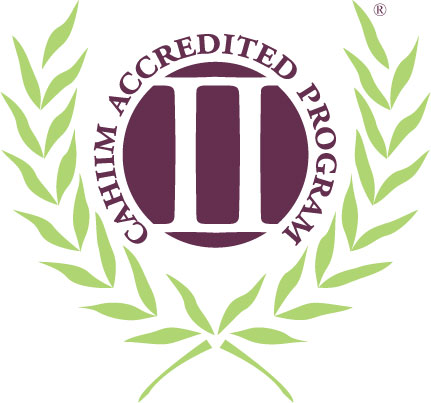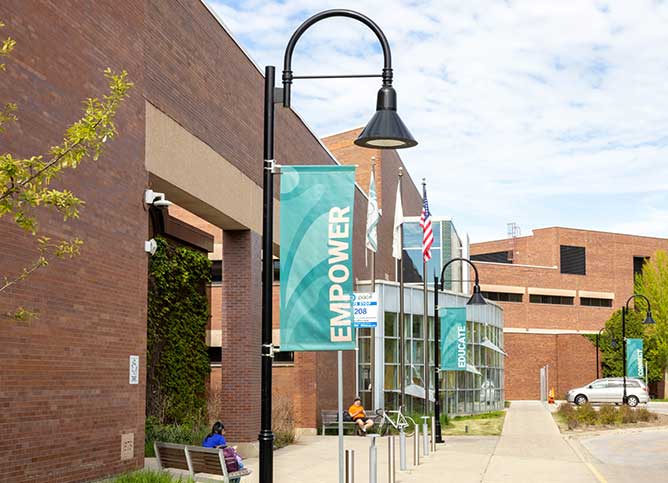Health information technology (HIT) brings together medicine, computer technology and information management to provide structured information management to health care. If you want to learn a diverse set of skills and make a difference in the lives of patients and their care providers, a career in health information technology is for you.
An HIT professional is trained to work in all aspects of health information management. You will learn the computer skills to move into the electronic health information era. The program also includes knowing all the laws and regulations that apply to the release and management of health information. You learn procedures for health record processing, detailed medical coding with ICD-10-CM/PCS and CPT, reimbursement methodologies, and compliance issues, management of health information, and quality improvement.
Job opportunities exist in hospitals, ambulatory care, long-term care, cancer registries, managed care, and physician practices, as well as non-traditional areas in professional organizations, legal offices, industry vendors, insurance companies and pharmaceutical firms. Anywhere health information is used can become a job opportunity for the credentialed HIT profession.
The degree and certificates offered at Oakton, several of which are online, are designed to prepare you for a variety of entry-level positions in health care. You can play an important role in an industry that offers meaningful work, good pay and the opportunity to keep learning and advancing.
Oakton offers an associate in applied science (A.A.S.) in health information technology for students who wish to start a career in health information management or pursue an advanced degree at a four-year college or university. If you plan to pursue a four-year degree, consult the Office of Advising, Transitions and Student Success, as well as the transfer institution's catalog. This will help you select courses that will meet both Oakton's and your transfer school's requirements.
Associate in Applied Science in Health Information Technology prepares graduates for positions in health information management, clinical data specialist, medical coding, record processing, quality improvement, utilization management and reimbursement in the prospective payment system. The part-time HIT A.A.S. program can be completed fully online.
Learn More about the Health Information Technology A.A.S. Program
This curriculum prepares students for billing positions in physician offices and billing offices. Students take courses in computing, insurance procedures, CPT, ICD-10-CM coding, and medical terminology. Students must receive a minimum grade of C in all courses.
Timeframe for student outcomes: 08/01/2023 to 07/31/2024
Definitions
Minimum Requirements (A.A.S.)
Other Requirements (A.A.S.)
We also recommend that you view an Information Session video below prior to applying.
Clinical placements require a health assessment, certain immunizations, yearly flu vaccine, substance abuse testing, criminal background check, specific skill certification (i.e., CPR) and health insurance. These requirements represent an additional cost to the student.
All Oakton College Health Career students in nursing, physical therapist assistant, medical laboratory technology, pharmacy technician, phlebotomy, health information technology, cancer registry management, and medical assistant programs must have "clear" criminal background checks and drug screens in order to participate in any and all clinical components of any health career program courses. See the career programs pages for further details.
To comply with state statutes and clinical affiliation agreements, and to provide a safe environment for students, employees, and patients cared for by students, those accepted into Oakton's health career programs will be required to complete a criminal background check and drug screening through a company contracted by the College. Health Career students will be charged a fee for this service.
Timelines for completing criminal background checks and drug screens may vary among the various programs. Deadline dates for each program will be provided by the individual department chairs at the time of a student's acceptance into a health career program.
Students without a clear criminal background check and/or clear drug screen will not be allowed to enroll in clinical practicum courses or attend clinical programs. This would further necessitate that the student withdraw from the health career program at that time.
Students who refuse a criminal background check and/or drug screen will not be considered "clear" and will not be authorized to participate in the clinical component of the health career program, necessitating withdrawal from the program at that time.
Individual results of student background checks and drug screens are considered confidential.
Determination of whether or not a student can participate in the clinical component of a particular health career program will be communicated to the respective department chairs by the Background Check/Drug Screen vendor. Students may view their personal results on the vendor's website.
With the availability of the COVID-19 vaccine, our clinical site partners are updating their requirements for COVID-19 vaccination. Oakton must also follow the requirements of our clinical sites with regard to immunization requirements. It is the decision of the clinical sites, not Oakton, if immunizations are required for our students. Effective for the Spring 2022 semester, the clinical facility partners will not permit students to participate in clinical experiences at any of their facilities without the COVID-19 vaccination.
Students are not employees and have neither employee benefits nor access through employee health services at the facility, therefore, accommodations for declination of vaccination will not be honored. As guests of each facility, Oakton programs must abide by the rules of the facility.
Students must provide proof of vaccination. Failure to provide documentation will result in student dismissal from clinical courses.
Essential Skills Expected of a Health Information Technician, Medical Coder and Biller, and Cancer Tumor Registrar.
Successful completion of the HIT and CRM programs requires the student to participate in and satisfy the Professional Practice Experience (PPE) portion of the program. Students attend a variety of PPE settings including but not limited to hospitals, long term care centers, ambulatory settings, specialty treatment facilities, and managed care facilities. Participation in the PPE requires essential skills that allow the student to perform successfully. Students may be expected to perform satisfactorily in the following domains:
Physical
The student should be able to:
Cognitive
The student should be able to:
Emotional/Psychological
The student should be able to:
The above statements were derived in part from job descriptions and work expectations from various employers of health information technicians and from guidance from AHIMA for the HIT A.A.S., and NCRA for the CRM certificate. Each student’s right to participation in the PPE portion of the curriculum is also contingent upon compliance with the rules of the PPE. The PPE has the sole discretion to determine when its rules have been violated.
 The Health Information Management accreditor of Oakton College is the Commission on Accreditation for Health Informatics and Information Management Education (CAHIIM). The College’s accreditation for an Associate degree in Health Information Technology has been reaffirmed through 2028.
The Health Information Management accreditor of Oakton College is the Commission on Accreditation for Health Informatics and Information Management Education (CAHIIM). The College’s accreditation for an Associate degree in Health Information Technology has been reaffirmed through 2028.
All inquiries about the program’s accreditation status should be directed by mail to CAHIIM, 200 East Randolph Street, Suite 5100, Chicago, IL, 60601; by phone at 312.235.3255; or by email at info@cahiim.org.
Enrolling at Oakton College can save you thousands of dollars and help you earn more over the course of your career. Our tuition is among the lowest in the region, and we offer many ways to bring your costs down even more.
99 percent of Oakton students graduate without debt.
To help you get there, you can apply for a scholarship, which you don’t have to pay back. We award $12 million in scholarships annually. Financial Aid includes grants, loans, and other forms of financial assistance that can reduce your costs of attending college.
We offer payment options that give you control over how you pay. Pay all at once or spread your payments over the course of the semester.
Learn more about your options for paying for your education


Hanna Wierzchowski, DDS, RHIA, COC, CPC
Professor and Chair
A.A.S. Oakton College
B.S. University of Illinois Chicago
D.D.S. Bialystok Dental School, Bialystok, Poland
hwierzchowski@oakton.edu
847.635.1695
Office: Room 2844 Des Plaines
Adriana Raicu, RHIA
Assistant Professor
A.A.S. Oakton College
B.S. Legal Studies Craiova University, Romania
araicu@oakton.edu
847.376.7083
Office: Room 2807 Des Plaines
Meet our part-time faculty
Lincy Chandy, RHIA, CCS
Lecturer
A.A. Oakton College
B.S. National-Louis University
lchandy@oakton.edu
847.635.1684
Karen Conway
Ava Dacka
Geraldo Salvacion, MBA, RHIT
Lecturer
A.A. Oakton College
B.S. National-Louis University
gsalvaci@oakton.edu
847.635.1684
Traci Strobel, CCS-P, CHA, CHCO, CIFHA
Lecturer
B.S. Bemidji State University
tstrobel@oakton.edu
847.635.1684
Davita Webb, RHIT
Lecturer
A.A.S. Oakton College
B.S. George Williams College
M.H.A. National Louis University
dwebb@oakton.edu
847.635.1684
Hanna Wierzchowski, DDS, RHIA, COC, CPC
Professor and Chair
A.A.S. Oakton College
B.S. University of Illinois Chicago
D.D.S. Bialystok Dental School, Bialystok, Poland
hwierzchowski@oakton.edu
847.635.1695
Office: Room 2844 Des Plaines
Adriana Raicu, RHIA
Assistant Professor
A.A.S. Oakton College
B.S. Legal Studies Craiova University, Romania
araicu@oakton.edu
847.635.1684
Office: Room 2807 Des Plaines
Meet our part-time faculty
Lincy Chandy, RHIA, CCS
Lecturer
A.A. Oakton College
B.S. National-Louis University
lchandy@oakton.edu
847.635.1684
Karen Conway
Ava Dacka
Geraldo Salvacion, MBA, RHIT
Lecturer
A.A. Oakton College
B.S. National-Louis University
gsalvaci@oakton.edu
847.635.1435
Traci Strobel, CCS-P, CHA, CHCO, CIFHA
Lecturer
B.S. Bemidji State University
tstrobel@oakton.edu
847.635.1684
Davita Webb, RHIT
Lecturer
A.A.S. Oakton College
B.S. George Williams College
M.H.A. National Louis University
dwebb@oakton.edu
847.635.1684
Licensure Requirements: Each state and territory has different licensure and certification requirements. Oakton has researched and/or contacted state licensing authorities to confirm that the program meets the educational requirements leading to professional licensure. Other licensure requirements may include professional certification exams, background checks, years of work experience, fingerprinting, etc.
Licensure information is reviewed and updated on this site in June of each year. Licensure information is reviewed and updated on this site in June of each year. As of July 1, 2020, we have determined that there are no formal state licensure requirements for Registered Health Information Technicians (RHIT). Individuals that successfully complete Health Information Technology AAS Degree Program curriculum:
Meets the education requirements leading to licensure/certification in these states and U.S. Territories: Illinois, Alabama, Alaska, American Samoa, Arizona, Arkansas, California, Colorado, Connecticut, Delaware, District of Columbia, Florida, Georgia, Guam, Hawaii, Idaho, Indiana, Iowa, Kansas, Kentucky, Louisiana, Maine, Maryland, Massachusetts, Michigan, Minnesota, Mississippi, Missouri, Montana, Nebraska, Nevada, New Hampshire, New Jersey, New Mexico, New York, North Carolina, North Dakota, Northern Mariana Islands, Ohio, Oklahoma, Oregon, Pennsylvania, Puerto Rico, Rhode Island, South Carolina, South Dakota, Tennessee, Texas, U.S. Virgin Islands, Utah, Vermont, Virginia, Washington, West Virginia, Wisconsin, Wyoming
Does NOT meet the education requirements For licensure/certification in these states and U.S. Territories:
We have not made a determination if the program curriculum meets the requirements for licensure/certification in these states and US Territories:
If you intend to practice in any state other than Illinois, you should contact the appropriate licensing agency to independently verify whether Oakton’s program satisfies the educational requirements for licensure in a particular state before beginning Oakton’s program. Be aware that state licensure requirements may change from time to time and that states may have conditions for licensure in addition to educational requirements.
This information is provided to meet the Disclosure Requirements for Academic Programs Leading to Professional Licensure or Certification.